
Naming every expedition participant in a telepresence-enabled mission is next to impossible! Many from dozens of institutions across the country have provided input into the expedition plan and are expected to participate. However, we've assembled information about the members of the science and remotely operated vehicle teams who are physically onboard NOAA Ship Okeanos Explorer, and whose voices you are likely to hear most often when watching the live video. And of course, none of this exploration would be possible without the work of the dedicated NOAA Commissioned Officer Corps and civilians who operate NOAA Ship Okeanos Explorer as part of NOAA's fleet managed by NOAA's Office of Marine and Aviation.
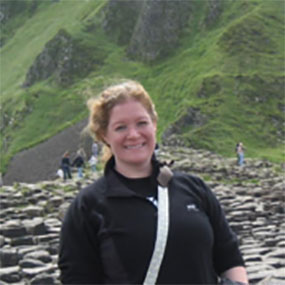
Leg 1, Co-science Lead
Associate Director, NOAA Cooperative Institute for Ocean Exploration, Research, and Technology
Deb Glickson is a marine geologist with a background in hydrothermal vent geology. She received her Ph.D. in Oceanography from the University of Washington in 2007, and also holds a M.S. in Geology from Vanderbilt University and a B.S. in Geology from the University of Florida. Her PhD research focused on the magmatic and tectonic evolution of the Endeavour hydrothermal vent fields.
After completing her Ph.D., Deb moved into science policy, where she used her background in geology and oceanography to provide advice to federal and state governments. She is currently the Associate Director of the NOAA Cooperative Institute for Ocean Exploration, Research, and Technology.
Deb has sailed on 16 previous deep-sea research expeditions in the Atlantic, Pacific, and Indian Oceans, and has explored the seafloor with autonomous vehicles, remotely operated vehicles, and manned submersibles. She was also privileged to be a shore-based scientist on the 2005 NOAA telepresence-enabled cruise to the Lost City hydrothermal vent field. Having never been to the Marianas Islands or Micronesia before, Deb is very excited to explore the Marianas Trench Marine National Monument, visit the Commonwealth of the Northern Mariana Islands, and see the diverse and unique hydrothermal vent systems, geology, and biological communities that are associated with the region.
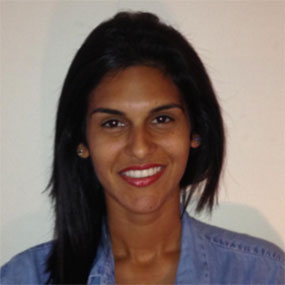
Leg 1, Co-science Lead
University of Hawaii at Manoa
Diva Amon is a deep-sea ecologist with a special interest in chemosynthetic habitats and anthropogenic impacts in the deep sea. In 2013, she completed her Ph.D. jointly at the University of Southampton and the Natural History Museum in London, United Kingdom. Since then, she has been a postdoctoral fellow in the Department of Oceanography at the University of Hawai’i at Manoa. Currently, her work is focused on understanding what megafauna inhabit the largely unknown deep sea of Clarion-Clipperton Zone in the Pacific Ocean, in advance of the mining of this region for polymetallic nodules. Her doctoral research focused on the ecology of chemosynthetic environments, such as hydrothermal vents, wood falls, and whale falls.
Although this is Diva’s 13th deep-sea expedition, she has never worked in the western Pacific Ocean before. Having been born and raised in Trinidad and Tobago, she is comfortable working in the tropics and is looking forward to her time in the Commonwealth of the Northern Mariana Islands and the Marianas Trench Marine National Monument.
You can find out more information about Diva on Twitter (@DivaAmon ) or by visiting her website (www.divaamon.com ).
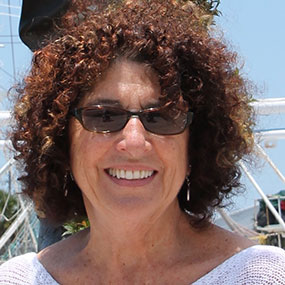
Leg 3, Co-science Lead
Research Professor and Executive Director of the NOAA Cooperative Institute for Ocean Exploration, Research, and Technology, Harbor Branch Oceanographic Institute, Florida Atlantic University; Professor of Marine Biotechnology at Wageningen University, Netherlands.
Shirley Pomponi is Research Professor and Executive Director of the NOAA Cooperative Institute for Ocean Exploration, Research, and Technology, Harbor Branch Oceanographic Institute, Florida Atlantic University, and Professor of Marine Biotechnology at Wageningen University, Netherlands. She received her Ph.D. in Biological Oceanography from the University of Miami.
Shirley's research interests are sponges—their biology, taxonomy, ecology, chemistry, molecular biology, and cell culture. She's particularly interested in developing in vitro (i.e., cell culture) techniques to study why and how sponges produce chemicals that may be developed into drugs to treat diseases like cancer and Alzheimer's.
Although she spends much of her time doing research administration, the best part of her job is conducting fieldwork, especially undersea exploration. She has led numerous research expeditions worldwide and has made more than 300 dives in Harbor Branch's Johnson-Sea-Link manned submersibles. Diving in the Mariana Trench has been on Shirley's bucket list for a long time, so she's especially excited to be participating in this mission.
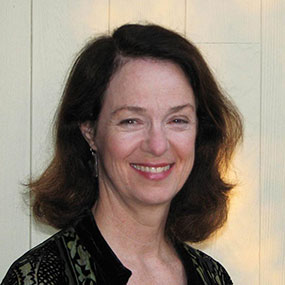
Leg 3, Co-science Lead
Patricia Fryer, Ph.D., is a marine geologist interested in all aspects of lithospheric plate subduction, the process that forms ocean trenches and island arcs. She is a veteran of 46 marine research expeditions, often in the role of chief scientist, and her research has focused on the very deepest parts of the Mariana Trench, including the question of why the Challenger Deep is so deep. She also has an active interest in serpentine mud volcanoes formed as a consequence of subduction and deformation of the Mariana plate above the subduction zone.
Patty has dived in the submersibles Alvin and Shinkai 6500 and has conducted expeditions with remotely operated vehicles (ROVs) in the Mariana region.
She received her college degree in geology from the College of William and Mary and her graduate degrees in geology and geophysics from the University of Hawai`i at Manoa.
She works on samples of sediment and rocks from the Mariana Trench region to understand not only the physical and chemical processes responsible for their origins, but to collaborate with biologists to determine the implications of microbial communities observed thriving on serpentinized peridotite (mantle rock) contained in the mudflows from the serpentinite volcanoes and exposed in the deepest parts of the trench slope.
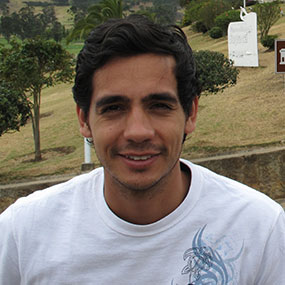
Fernando graduated from the University of Hawaii at Manoa with a B.S. in Mechanical Engineering. During his studies, he had experience in several fields including conceptual design, aerospace research, mechanical design, robotics and software development. From these activities he was able to intern for NASA at the Jet Propulsion Laboratory, present research in a national conference, and even coauthor a technical paper in the Journal of the Astronautical Sciences. His most recent position was at the Field Robotics Laboratory (FRL) where he helped support operations, testing and software development for two unmanned surface vehicles. From his time in FRL, he discovered a true passion for development and design of robotic systems. Originally from Colombia, Fernando enjoys outdoor activities and currently resides in State College, Pennsylvania.
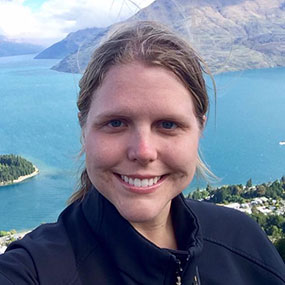
Leg 1
Video Producer, Global Foundation for Ocean Exploration
Caitlin Bailey holds a MFA in Science and Natural History Filmmaking from Montana State University and a B.S. in Animal Biology from Texas A&M University-Corpus Christi. Her background includes fieldwork with sea otters in Alaska, lab research on wild mice vocalizations, and mentoring undergraduate students in biology. In pursuit of her filmmaking career, Caitlin held a writing and film internship at NASA Goddard Space Flight Center and worked as a camera operator and stage manager with Montana PBS. Before her current position on the Okeanos Explorer, she served as a video engineering intern onboard the E/V Nautilus. This is her first expedition onboard the Okeanos Explorer and she is looking forward to being a contributing member of the video-production team at the Global Foundation for Ocean Exploration. Caitlin currently resides in San Antonio, Texas where she enjoys photography, SCUBA diving, and volunteering for TEDx events.
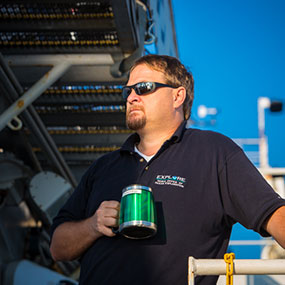
Legs 1 and 3
Electronic Systems Engineer, Global Foundation for Ocean Exploration
Roland Brian brings 29 years of experience and a keen eye for precision HD video to the program as a video/satellite and telepresence engineer. Roland began his career in the U.S. Air Force where he worked as a Satellite Communications Engineering Technician with visions of working on the U.S. Space Station. He traded in that quest for one of deep-ocean exploration and sharing beautiful imagery with the world. He has worked with the NOAA Office of Ocean Exploration and Research (OER) and the Okeanos Explorer Program since 2009 and has been engaged in every telepresence-enabled remotely operated vehicle (ROV) expedition. He has also provided services for other projects using OER's mobile telepresence system, including the 2012 Ring of Fire Expedition. His duties aboard NOAA Ship Okeanos Explorer include operation and maintenance of the ship's Telepresence and video systems, including on ROV Deep Discoverer and the Seirios camera platform. Again, Roland's experience embodies the breadth and depth of knowledge the OER program encourages. When not fine-tuning the video and telepresence systems or training and mentoring new team members, he's actively involved in the editing process of our ever-expanding ocean exploration video library. While not at sea, Roland enjoys life with his wife and family in sunny Sarasota, Florida.
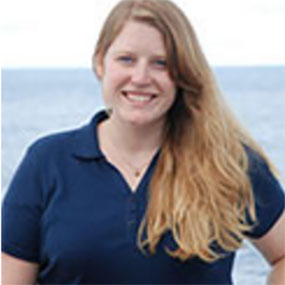
Leg 3
Field Operations Specialist, NOAA Office of Ocean Exploration and Research
Kasey Cantwell is a Field Operations Specialist with NOAA's Office of Ocean Exploration and Research (OER). Kasey has a Master of Science degree in Marine Affairs and Policy and Marine Geology and Gepophysics, and a Bachelor of Science degree in Marine Science and Biology, both from the University of Miami Rosenstiel School of Marine and Atmospheric Science. Kasey is responsible for coordinating telepresence-enabled expeditions conducted onboard NOAA Ship Okeanos Explorer. Since joining OER in 2012, she has coordinated over a dozen expeditions and projects, including multidisciplinary expeditions to the Atlantic submarine canyons, the Marianas, Pacific Remote Islands Marine National Monument, now known as Pacific Islands Heritage Marine National Monument, and Glacier Bay National Park.
Beyond deep-sea exploration, Kasey’s background includes imagery-based mapping of coral reefs throughout the Caribbean, long-term ecosystem monitoring, and evaluating resource management strategies to improve efficiency and data quality.
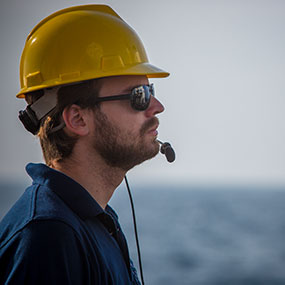
Legs 1 and 3
Mechanical Engineer, Global Foundation for Ocean Exploration
Joshua Carlson attended the University of Massachusetts, Dartmouth, where he received a B.S. in Mechanical Engineering with minor in Business Administration. He went on to receive his M.S. in Marine Observation Technology from the University of Massachusetts, Dartmouth School for Marine Science and Technology. Josh has a diverse background, encompassing the use of autonomous underwater vehicles (AUVs) and other types of ocean observation platforms for the purpose of studying ocean turbulence. He has designed and built a deep-ocean camera platform for filming deep-water krill in the Antarctic Ocean and provided mechanical engineering and software capabilities on the Woods Hole Oceanographic AUV Sentry during a recent cruise aboard the NOAA ship Okeanos Explorer. In his current position with NOAA’s Ocean Exploration program, Josh provides engineering, programming, and at-sea support, acting in the capacity of navigator, pilot, and co-pilot for NOAA’s 6000-meter-rated remotely operated vehicle system, Deep Discoverer. His broad range of skills in both engineering and software control development makes him an invaluable member of our team. When not traveling, Josh resides in Fairhaven, Massachusetts.
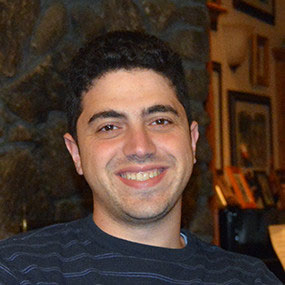
Leg 3
Electrical Engineer, Global Foundation for Ocean Exploration
David Casagrande holds a B.S. and M.S. in Ocean Engineering from the University of Rhode Island, completing his masters in 2013 with a focus on robotic instrumentation and computer vision. As a student, he worked on an autonomous profiling and imaging platform used for fisheries habitat assessments and counts. Since graduating, he has worked on a range of autonomous profiling and surface vehicles, measuring chemical and physical properties of the water, sonar mapping, and sea floor imaging. He has sailed on a number of research cruises to support and operate these vehicles. David also worked on underwater stereo camera systems, both standalone and ROV-based. Improving the calibration of these camera systems, required for accurate 3D reconstruction and measurements, continues to be an interest.
When not at sea, he lives in South Kingstown, Rhode Island.
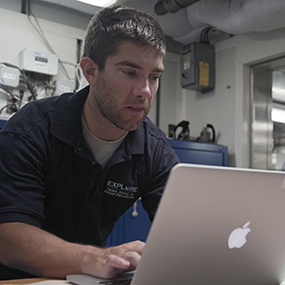
Leg 3
Marine Scientist, NOAA National Centers for Environmental Information
Matt Dornback brings a background of marine science, data management, and outreach to the NOAA National Centers for Environmental Information. Currently, he works with the Deep-Sea Coral Research and Technology Program to manage their data and make it available to the public through deepseacoraldata.noaa.gov.
He holds a B.S. in Marine Biology from the University of North Carolina Wilmington and a M.S. in Biological Oceanography from the University of Southern Mississippi Department of Marine Science.
During cruises, Matt manages the data collected from samples collected by the ROV and works with the Science Leads to properly handle and preserve the specimens for further scientific analysis.
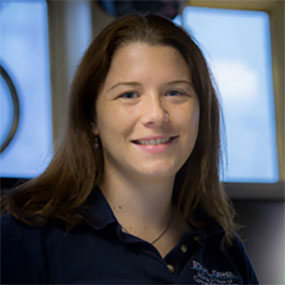
Leg 1
Expedition Manager, NOAA Office of Ocean Exploration and Research
Kelley Elliott is the Senior Expedition Manager for NOAA’s Office of Ocean Exploration and Research. She holds a master’s degree in maritime archaeology from the University of Southampton and a bachelor’s degree in environmental conservation from George Mason University. Ms. Elliott is responsible for planning, coordinating, and managing expeditions conducted by NOAA Ship Okeanos Explorer. She has coordinated a dozen Okeanos expeditions since 2009, including eight that have pushed the frontiers of shore-based participation via telepresence.
Over the last decade, her combined professional and academic field experiences have taken her around the globe to investigate a diversity of science topics from Arctic Ocean ecology, tropical ecosystems, and submerged cultural heritage to deep-sea ecosystems, including hydrothermal vents, gas seeps, submarine canyons, and deep-sea coral habitats. An explorer at heart, Ms. Elliott spends most of her spare time exploring the great outdoors, from the volcanoes of Nicaragua to the trails surrounding her home in Reston, Virginia.
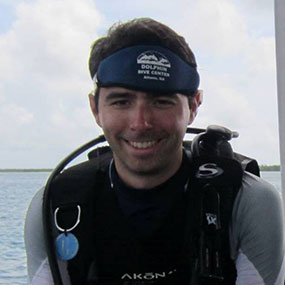
Leg 1
Marine Biologist and ROV Navigator
When Brian was five years old, he decided that he wanted to be a marine biologist and explore the unknown reaches of the planet, and now he has his dream job. Originally from land-locked Athens, Georgia, Brian grew up fascinated with marine mammals and the ocean. Brian attended the Honors College at the College of Charleston (CofC) in South Carolina where he majored in Marine Biology and minored in Marine Geology. While at CofC, he had the opportunity to sail on multiple research cruises aboard two different NOAA research vessels and meet multiple NOAA Commissioned Officer Corps members. Shortly after graduating with honors from CofC, Brian was awarded a commission in the NOAA Corps. His first sea assignment was as a Junior Officer aboard NOAA’s Okeanos Explorer, America’s Ship for Ocean Exploration. Upon completion, Brian was then assigned to NOAA’s Ocean Exploration Program, where he worked as an Expedition Coordinator for the Okeanos Explorer. Now separated from the NOAA Corps, Brian works with The Global Foundation for Ocean Exploration as an Expedition Coordinator and member of their engineering group. Brian has participated in or led more than 25 expeditions of exploration taking him to two oceans (Atlantic and Pacific), three continents (North America, South America and Asia), and through the waters of more than five countries (Ecuador, Panama, Costa Rica, Honduras, Indonesia). Brian is serving as the ROV navigator on this expedition.
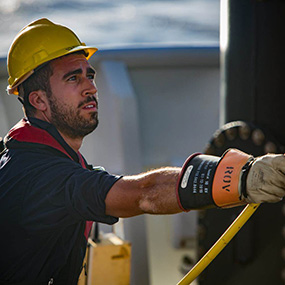
Legs 1 and 3
Electrical Engineer
Sean Kennison holds a B.S. in Mechanical Engineering with a minor in Engineering Mechanics from Pennsylvania State University. He first sailed on the Okeanos Explorer as an intern and member of the Engineering Group, where he performed tasks associated with the launch, operation, and recovery of the ROV system. He has also worked shoreside, designing mechanical parts for the ROVs and assisting with assembly and testing of previously and newly installed equipment. Sean also assisted with installing electronics, testing, data analysis, and troubleshooting on the vehicle. Most recently, he assisted in assembling and modifying a new bio storage box for the Deep Discoverer ROV. While at Penn State, Sean served as team leader on a number of engineering design projects.
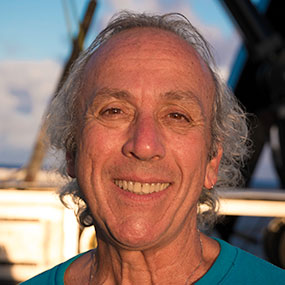
Leg 3
Global Foundation for Ocean Exploration
Don Liberatore has more than 35 years of experience in manned and unmanned submersible operations as a diver-medic, mixed gas lock-out diver and hyperbaric chamber operator and Chief Submersible Pilot for Harbor Branch Oceanographic Institution’s Johnson-Sea-Link I & II research submersibles. He has logged nearly 1,800 dives as a pilot, hundreds more as a pilot-trainer, and over 200 as a mixed gas lock-out diver to 350 feet.
In addition to science missions, he has participated in recovery operations as Submersible Operations Coordinator. These include the search and recovery of the Space Shuttle Challenger, excavation and documentation of the U.S.S. Monitor, documentation of the wreck of the S.S. Edmund Fitzgerald, and the search for the wreckage of Amelia Earhart’s plane in the central Pacific Ocean using two REMUS 6,000 meters autonomous underwater vehicles.
He has worked as crew member and/or project manager for the Kraken (UCONN), Mohawk (UNCW) and Global Explorer (DSSI/Oceaneering Int.) ROVs. He is participating in this expedition as a member of the Deep Discoverer crew.
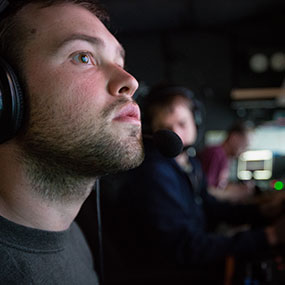
Leg 1
Electrical Engineer
Jeff Laning holds a B.S. in Electrical Engineering from the University of Vermont. He started his career as an intern with Greensea Systems, Inc., where he worked on design, development, and integration of components and software associated with remotely operated vehicles and autonomous underwater vehicle systems.
Jeff is one of our youngest members and came to our group with a desire to learn new and complex electrical systems. Electrical engineers interested in and capable of working on deep submergence systems are one of the hardest positions to fill. Jeff has done a great job as a key member of the team that built Deep Discoverer and has become a skilled pilot, co-pilot, and navigator. His contribution to ocean exploration is certainly something to be proud of and we hope that other young engineers will be inspired by what he has accomplished. Jeff currently resides in Vermont.
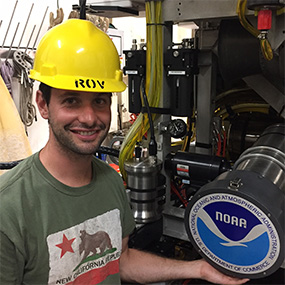
Legs 1 and 3
Mechanical Engineer - Global Foundation for Ocean Exploration
Andy earned a Bachelor's in Ocean Engineering from Texas A&M. He then obtained a Master's in Mechanical Engineering focusing on Robotic Artificial Intelligence and Systems Engineering from Embry Riddle in Daytona Beach. After college, he lent his knowledge to the oilfield service industry for four years, living in various places including Wyoming, North Dakota, and Alaska while on assignment. Recently, he has come back to the mechanical and software side of engineering to contribute to the team at the Global Foundation for Ocean Exploration. He loves traveling, exploring, and being outdoors.
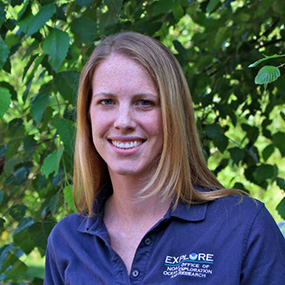
Leg 1
Physical Scientist/Hydrographer, NOAA Office of Ocean Exploration and Research
Lindsay earned her master's in Ocean Mapping from the University of New Hampshire in 2013 and her bachelor's degree in Geological Sciences from Brown University in 2007. Lindsay worked as a geologist in the environmental field for three years before returning to graduate school. In graduate school, Lindsay gained practical seafloor-mapping experience during research cruises to the Mediterranean Sea and Arctic Ocean. Lindsay joined the Ocean Exploration program in early 2014 as a Mapping Team Lead, where she is responsible for the ocean mapping systems onboard the NOAA Ship Okeanos Explorer. At sea, Lindsay produces maps that are used to direct the exploration process and plans the day-to-day mapping routes to ensure the ship is always exploring efficiently.
On shore, Lindsay works at the Integrated Ocean and Coastal Mapping Center at the University of New Hampshire where she contributes to expeditions through data processing and archiving, operational planning, and mapping product development. Lindsay resides in Rye, New Hampshire.
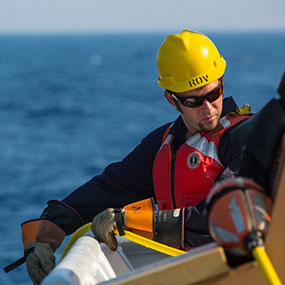
Legs 1 and 3
Ocean/Mechanical Engineer, Global Foundation for Ocean Exploration
Karl McLetchie is a graduate of the Massachusetts Institute of Technology. He holds B.S. and M.S. degrees in Ocean and Mechanical Engineering. After graduating, he worked as an engineer on the development of autonomous underwater vehicles and as a naval architect on the design of high-speed aluminum vessels. After a brief, two-year stint of delivering sailboats around the Caribbean, he started his own contracting company, SeaKnowledge, in 2008. Through SeaKnowledge, Karl works on the mechanical design and operation of underwater vehicles. Karl has worked on Okeanos Explorer for six seasons, in all positions on the ROV Team from Winch Operator to Dive Supervisor. When not on assignment for Ocean Exploration, Karl resides in Pemaquid, Maine.
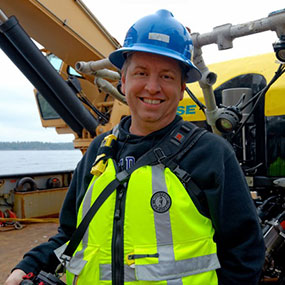
Leg 1
Video Producer, Editor, Post-Production Supervisor
Ed McNichol is a communications technology professional with 30+ years of global video expertise. He is an avid scuba diver and Divemaster based in Seattle, Washington. He combines both of these interests through his work supporting deep-sea research and exploration using remotely operated vehicles (ROVs). He has served as an onboard Expedition Video Systems Specialist and Mission Photographer on more than a dozen international missions, working with seven different vehicles. His specialties include designing, building, and operating sophisticated shipboard video systems in a mobile form factor. These systems perform a multitude of mission critical functions, including recording and archiving of high-definition video with embedded metadata, producing live satellite streaming with interactive webcasts, and video production services. He also has experience in best practices for digital asset management and protection, as well as event logging. He enjoys capturing dynamic still photos that feature shipboard mission operations while including rich metadata.
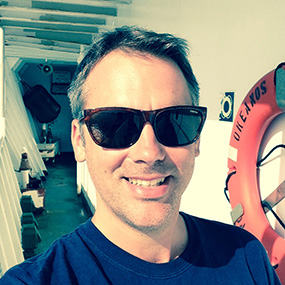
Leg 3
Mapping Technician
Jason Meyer first pursued his passion for seafloor exploration while earning a B.S. from the University of Hawaii Hilo in Geology studying volcanic processes along the Hawaiian Islands. He would later go on to receive his M.S. in Geology from the University of South Carolina focusing on regional mapping and classification of seafloor volcanoes along the East Pacific Rise and the Galapagos Spreading Center in the Pacific Ocean.
Since graduating in 2006, Jason has worked as a hydrographer mapping the coast, rivers, reservoirs, and lakes along the west coast from Mexico to Alaska and Hawaii. He has endured long hours and challenging conditions at the helm collecting data that serves maritime navigation and construction, environmental studies, and academic exploration. Since dedicating his career to hydrography, Jason continues to be driven by curiosity and the challenge of the unknown depths.
This will be Jason's second season working on the Okeanos Explorer as a mapping technician.
While not at sea, he enjoys climbing, surfing, and backpacking. Jason resides in Battle Ground, Washington.
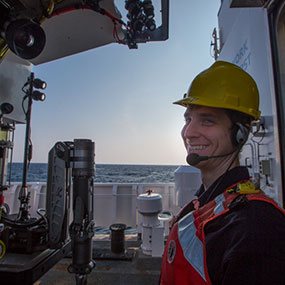
Leg 1
Systems/Robotics Engineer
Bobby Mohr is a Systems/Robotics Engineer, specializing in autonomous and remotely operated underwater vehicles. He holds a B.S. in physics and graduated cum laude from Davidson College in 2009. Bobby started his career as an engineering technician with Greensea Systems where he was responsible for the design, development, and testing of autonomous underwater vehicle control systems.Like many of our engineers, Bobby realized that he would enjoy the design-build process more if he was able to also pursue the challenges of making vehicles work successfully at sea.
After serving on several projects at Greensea where he specialized in electrical and software systems support, Bobby joined the Ocean Exploration program as an electrical systems engineer.During his time at Greensea and now with NOAA, he has been one of the key electrical engineers on the development of our 6000-meter-rated remotely operated vehicle system, Deep Discoverer and Seirios. Like many of our engineers, he has multiple skills and is a tremendous asset to our program.
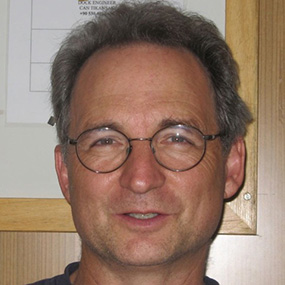
Legs 1 and 3
Mechanical Engineer/Pilot
Jim Newman’s career has centered on the development and deployment of remotely operated underwater vehicles (ROVs) for various scientific uses. Among other projects, Jim led the development and deployment of underwater vehicle systems under contract to the Institute For Exploration (now the Ocean Exploration Trust; OET), including the ROVs Hercules and Little Hercules. Jim also managed the acquisition and conversion of OET’s 64-meter exploration vessel, the E/V Nautilus. More recently, Jim has been working on development of ROVs and other underwater systems for the NOAA Office of Ocean Exploration and Research, Woods Hole Oceanographic Institution, Neptune Canada, and Hydroid. Jim is an adjunct Professor of Ocean Engineering at the University of Rhode Island, where he developed and taught a graduate-level course on ROV design. Jim was the Project Leader for the development of the Tiburon ROV system at Monterey Bay Aquarium Research Institute, and worked as a member of the engineering team that developed the JASON and JASON Junior ROVs at the Woods Hole Oceanographic Institution. Jim operates Woods Hole Marine Systems, Inc., and holds Bachelor’s and Masters’ degrees in Ocean Engineering from the Massachusetts Institute for Technology.
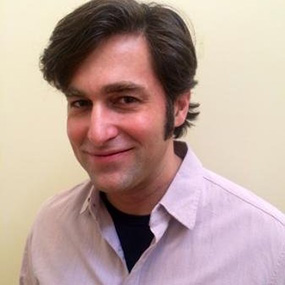
Leg 1
Software/Data and Satellite Engineer - ROV Pilot/Copilot
Andy started his professional career in the U.S. Navy where he ran a small electronic test system calibration laboratory and instructed NATO students in Satellite Ground Station repair. Following the Navy, he obtained a B.A. in History and a M.S. in Computer Science from the University of Vermont before hiring on as the Lead Software Engineer at Greensea Systems. During his tenure at Greensea, Andy designed, developed, and supported over 40 widely varying custom robot control systems and their operator interfaces for government and industry. Notably, Andy was the software lead on our very own Deep Discoverer and Seirios remotely operated vehicles.
Andy reports he so enjoyed working with the NOAA Office of Ocean Exploration and Research team, and their exploration mission, that he asked to join. Andy now splits his time between developing software; managing science and engineering data; maintaining the satellite communications system; and navigating, piloting, and co-piloting the deep-submergence vehicles. During his free time you can often find him in Monkton, Vermont.
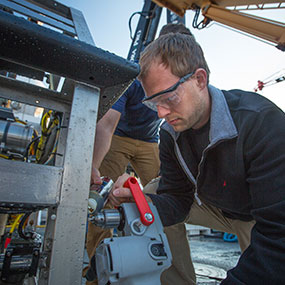
Legs 1 and 3
ROV Engineer and Telepresence Team Member
Dan Rogers has a diverse background in engineering, media production, and education. Daniel holds a B.S. in Physics and earned a M.S. in Mechanical Engineering from the University of Hawaii in 2013. Before starting his graduate program, Daniel worked as a Science Educator at the Bishop Museum in Honolulu. He continued to work with the museum as a Digital Media Producer while in school, partnering with the Polynesian Voyaging Society to produce a 30-minute film about traditional sailing and star navigation for the fulldome planetarium format. He has now been working as an ROV engineer and videographer on the Okeanos Explorer for over four years.
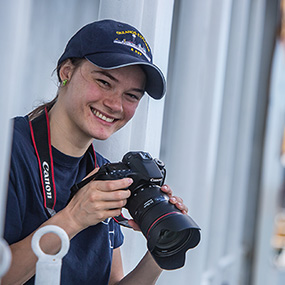
Legs 1 and 3
Videographer/Filmmaker
Tara Smithee is the Media and Visual Arts Coordinator for the Global Foundation for Ocean Exploration. Tara holds an M.S. in Earth Systems, Ocean Track, from Stanford University and is currently pursuing a MFA degree in Science and Natural History Filmmaking at Montana State University’s Science and Natural History Film School.
To prepare for attending film school, she pursued a number of internships, spending three months learning to use editing software at NOAA's Ocean Media Center, one month filming wolves with Landis Wildlife films in Yellowstone National Park, and making several more trips working side by side with industry professionals on NOAA Ship Okeanos Explorer. In between her classes, Tara continues to participate in expeditions with the Okeanos and produces films for the NOAA Ocean Explorer website. She has worked on a variety of films as a producer, camera, sound, and editor. She hopes to use film to share her voice and as a platform for conservation. When not at sea, she resides in Portland, Oregon, where she rides horses, tango dances, and SCUBA dives.
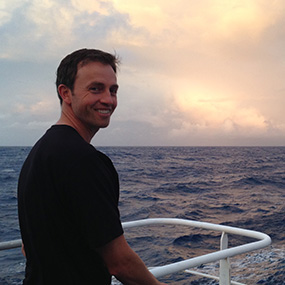
Leg 3
Physical Scientist/Hydrographer, NOAA Office of Ocean Exploration and Research
Derek Sowers is a physical scientist/hydrographer with the NOAA Office of Ocean Exploration and Research. During at-sea expeditions, he leads sonar data collection by planning the ship’s mapping routes and producing maps of seafloor and water column features to guide exploration. On shore, Mr. Sowers works at the Center for Coastal and Ocean Mapping/Joint Hydrographic Center at the University of New Hampshire to coordinate future mapping expeditions, process and archive data, and collaborate with other scientists. He has fourteen years of previous coastal research and management experience, including with NOAA’s National Estuarine Research Reserve network and EPA’s National Estuary Program, in both Oregon and New Hampshire. Mr. Sowers has participated in ocean research expeditions in the Arctic Ocean, Gulf of Maine, Gulf of Mexico, Pacific Northwest continental shelf, North Atlantic Canyons, and New England Seamounts. He holds a B.S. in environmental science from the University of New Hampshire and an M.S. in marine resource management from Oregon State University. He is also a part-time oceanography PhD student focused on utilizing Extended Continental Shelf and Okeanos Explorer data to develop marine ecological classification maps.
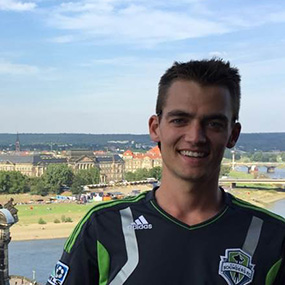
Legs 1 and 3
ROV Engineer, Global Foundation for Ocean Exploration
Levi Unema is an Eagle Scout from Lynden, Washington. He holds a B.S. in Electrical Engineering along with a Certificate in Electric Power Engineering from Michigan Technological University. Levi has experience in a number of different industries, ranging from the railroad, to steel mills, to automotive supplier light manufacturing.
Currently living in west Michigan, he enjoys being outdoors and staying active.
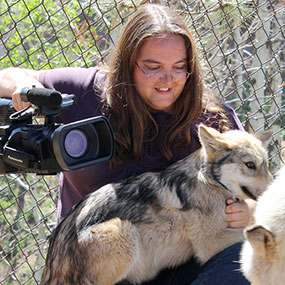
Leg 3
Video Producer, Global Foundation for Ocean Exploration
Annie White is an award-winning documentary filmmaker, photographer, and biologist who specializes in conservation biology and animal behavior. She holds a B.A. in Environmental, Population and Organismic Biology from the University of Colorado and is currently finishing an MFA degree in Science and Natural History Filmmaking at Montana State University.
Her career has taken her from collecting limestone samples and fossils in Wyoming, to studying wild wolf behavior, to filming cougars and grizzly bears. The years she spent living and traveling with captive ambassador wolves kick-started her interest in science education and inspired her to reach out to larger audiences through film.
Her credits include projects for National Geographic WILD, Curiosity Stream, the Yellowstone Wolf Project, and various other non-profit groups. Now the writer and producer for VisionHawk Films, Annie spends her time developing broadcast TV series about wildlife.
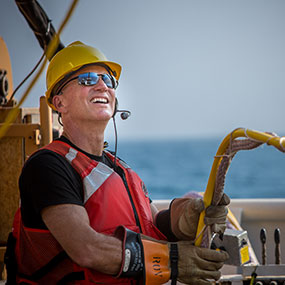
Leg 3
Electrical Engineer, Global Foundation for Ocean Exploration
With five U.S. patents and multiple publications outlining autonomous underwater vehicle (AUV) research under his belt, Jeff Williams has contributed more than his fair share to ocean exploration and engineering. Williams graduated from the Rochester Institute of Technology with an Electrical Engineering Degree, Highest Honors, and a driving sense of curiosity and adventure. After working as an engineer for firms including Raytheon and Ascom/Timeplex, Jeff set out to circumnavigate the globe, a voyage that would take him 40,000 miles and five years to complete.
It is at the convergence of this knowledge, skill, and experience that Jeff was to become an autonomous and remote underwater vehicle specialist. An accomplished pilot, navigator, and engineer, Jeff has a holistic understanding of the systems and techniques required to explore one of the most unforgiving environments on our planet. In 2010, Jeff worked with the National Research Council Canada to deploy an AUV for 10 days under Canadian Arctic Ice, an expedition risky to equipment and personnel alike. And while Jeff works in some of the most inhospitable environments on the planet, his up-beat disposition and sense of humor make him a pleasure to work with. He has been with the Okeanos Explorer program since 2011 where he's helped explore the deepest portions of the Mid-Cayman Rise, Galapagos Spreading Center, Gulf of Mexico, and Northeast Canyons.